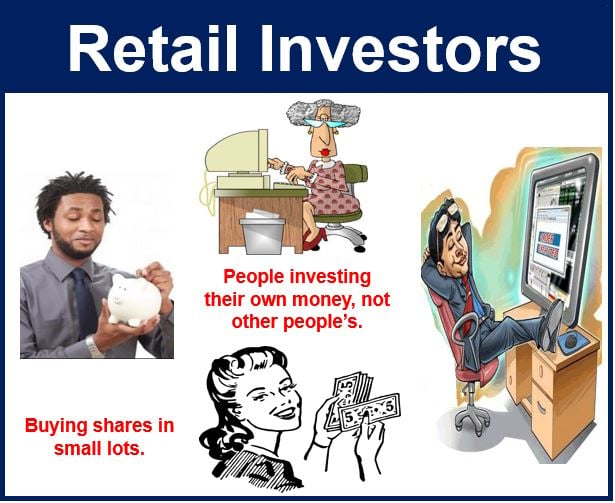A retail investor is an individual who buys securities for himself or herself, usually in relatively small amounts. Retail investors do not buy securities for an organization.
They include the average stock market investor. Some retail investors put their money in hedge funds, retirement plans and mutual funds, and in this way let institutional investors manage their investments.
Retail investors contrast with institutional investors, such as pension funds, mutual funds, hedge funds, etc. that buy and sell securities in gigantic amounts.
Most retail investors trade stocks in round lots, i.e. lots of 100 shares. They can, if they want, purchase or sell in lots of 75, 50, or 25, and even a single share. However, when taking into account the commission that must be paid, it is more cost effective to buy and sell in lots of at least 100.
 Many retail investors today trade online from their homes.
Many retail investors today trade online from their homes.
Institutional investors, on the other hand, are involved in block trades, i.e. buy or sell orders in lots of at least 10,000 shares. An institutional investor’s large trade can affect the price of a security considerably.
Smaller companies have lower share prices, which makes them more attractive for the retail investor. If a share costs $5 instead of $100, the smaller investor can more easily buy in lots of 100.
Retail investor more likely to get burned
History has repeatedly shown that as a group retail investors are too often led by their emotions, and let greed and fear dictate what they do.
David Pett wrote in the Financial Post that the best example of this was the buying frenzy that occurred during the latest stages of the tech boom when the Nasdaq index rose by over 85% in 1999 alone.
Instead of taking a step back following such a massive gain, investors poured another $140 billion into stock mutual funds during the first quarter of 2000. Inflows hit $55.6 billion in February 2000, compared to an average at the time of $29 billion.
Mr. Pett quoted Carl Richards, author of ‘the Behavior Gap: Simple Ways to Stop Doing Dumb Things with Money’, who had said:
“At a time when we should have shown some caution, we allowed ourselves to get swept along with the crowd, and we paid for it. March 24, 2000, was the peak of the dot-com bubble, and by October 2002 the market had lost 50 percent of its value. So we poured money in, just in time to get our heads taken off!”
The Financial Times Lexicon says the following about retail investors:
“Also called individual investor or small investor. An investor who buys securities in relatively small amounts for him or herself.”
